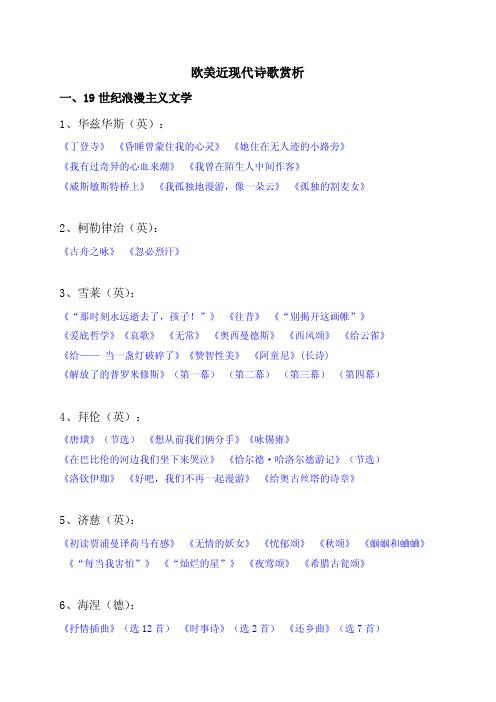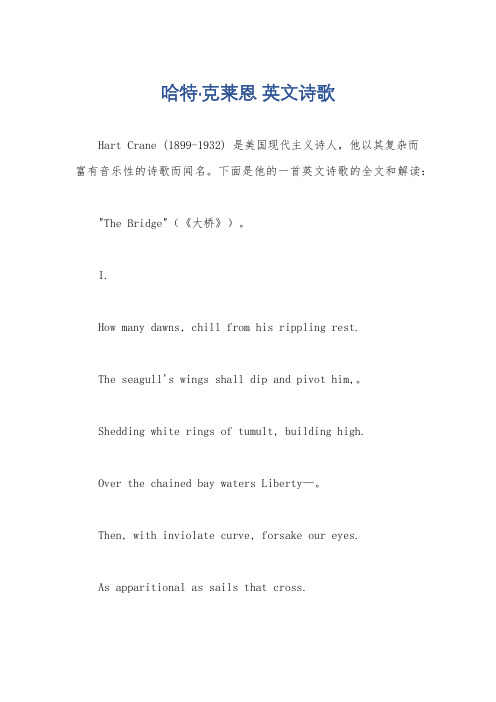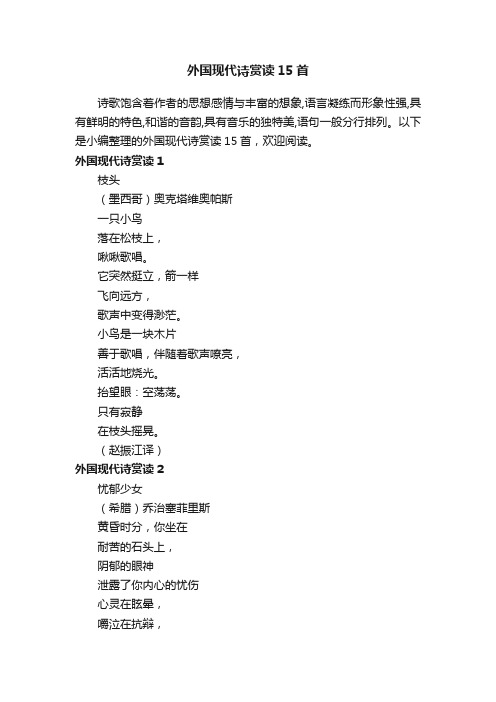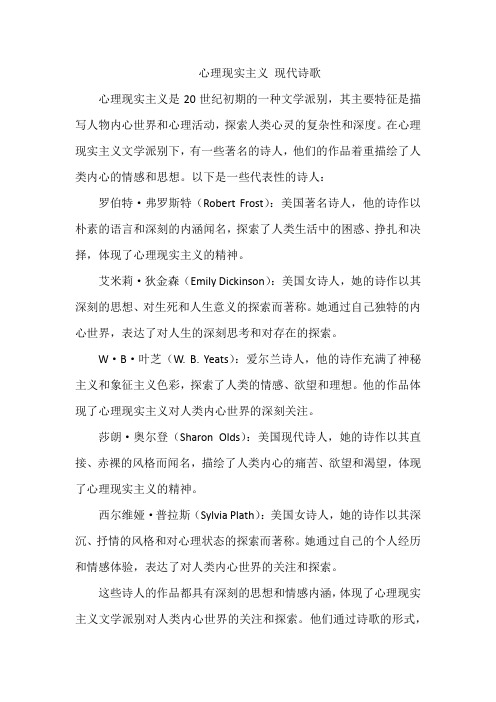美国现代诗歌(一)
外国诗歌——经典短诗99首。(1)

外国诗歌——经典短诗99首。
(1)1、博尔赫斯《局限》有一行魏尔伦的诗句,我再也不能记起,有一条毗邻的街道,我再也不能迈进。
有一面镜子,我照了最后一次,有一扇门,我将它关闭,直到世界末日降临。
在我的图书馆的书中,有一本我再不会打开——我正注视着它们。
今年夏天,我将满五十岁,不停地将我磨损呵,死神!2、普列维尔《公园里》一千年一万年也难以诉说尽这瞬间的永恒你吻了我我吻了你在冬日,朦胧的清晨清晨在蒙苏利公园公园在巴黎巴黎是地上一座城地球是天上一颗星3、威廉斯《便条》我吃了放在冰箱里的梅子它们大概是你留着早餐吃的请原谅它们太可口了那么甜又那么凉4、里尔克《预感》我像一面旗包围在辽阔的空间。
我觉得风从四方吹来,我必须忍耐,我下面的一切都还没有动静:门依然轻轻关闭,烟囱里还没有声音;窗子还没有颤动,尘土还很重。
我认出了风暴而且激动如大海。
我舒展开又跌回我自己,又把自己抛出去,并且独个儿置身在伟大的风暴里。
5、里尔克《沉重的时刻》此刻有谁在世上的某处哭,无缘无故地在世上哭,哭我。
此刻有谁在夜里的某处笑,无缘无故地在夜里笑,笑我。
此刻有谁在世上的某处走,无缘无故地在世上走,走向我。
此刻有谁在世上的某处死无缘无故地在世上死,望着我。
6、里尔克《秋日》主呵,是时候了。
夏天盛极一时。
把你的阴影置于日晷上,让风吹过牧场。
让枝头最后的果实饱满;再给两天南方的好天气,催它们成熟,把最后的甘甜压进浓酒。
谁此时没有房子,就不必建造,谁此时孤独,就永远孤独,就醒来,读书,写长长的信,在林荫路上不停地徘徊,落叶纷飞。
7、纪伯伦《论孩子》你们的孩子,都不是你们的孩子,乃是“生命”为自己所渴望的儿女。
他们借你们而来,却不是从你们而来,他们虽和你们同在,却不属于你们。
你们可以给他们以爱,却不可给他们以思想,因为他们有自己的思想。
你们可以荫庇他们的身体,却不能荫庇他们的灵魂,因为他们的灵魂,住在“明日”的宅中,那是你们在梦中也不能想见的。
欧美近现代诗歌赏析一、19世纪浪漫主义文学1、华兹华斯(英):《丁登..

欧美近现代诗歌赏析一、19世纪浪漫主义文学1、华兹华斯(英):《丁登寺》《昏睡曾蒙住我的心灵》《她住在无人迹的小路旁》《我有过奇异的心血来潮》《我曾在陌生人中间作客》《威斯敏斯特桥上》《我孤独地漫游,像一朵云》《孤独的割麦女》2、柯勒律治(英):《古舟之咏》《忽必烈汗》3、雪莱(英):《“那时刻永远逝去了,孩子!”》《往昔》《“别揭开这画帷”》《爱底哲学》《哀歌》《无常》《奥西曼德斯》《西风颂》《给云雀》《给——当一盏灯破碎了》《赞智性美》《阿童尼》(长诗)《解放了的普罗米修斯》(第一幕)(第二幕)(第三幕)(第四幕)4、拜伦(英):《唐璜》(节选)《想从前我们俩分手》《咏锡雍》《在巴比伦的河边我们坐下来哭泣》《恰尔德·哈洛尔德游记》(节选)《洛钦伊珈》《好吧,我们不再一起漫游》《给奥古丝塔的诗章》5、济慈(英):《初读贾浦曼译荷马有感》《无情的妖女》《忧郁颂》《秋颂》《蝈蝈和蛐蛐》《“每当我害怕”》《“灿烂的星”》《夜莺颂》《希腊古瓮颂》6、海涅(德):《抒情插曲》(选12首)《时事诗》(选2首)《还乡曲》(选7首)7、普希金(俄):《致恰阿达耶夫》《致克恩》《纪念碑》《致大海》《欧根·奥涅金》节选、《巴奇萨拉的喷泉》8、惠特曼(美):《我听见美国在歌唱》《一只沉默而耐心的蜘蛛》《哦.船长,我的船长!》《我在路易斯安那看见一棵栎树在生长》《眼泪》《黑夜里在海滩上》《从滚滚的人海中一小时的狂热和喜悦》《我自己的歌》(节选)9、爱伦·坡(美):《致海伦》《安娜蓓尔·李》《最快乐的日子》《乌鸦》《梦》《模仿》《湖——致——》二、19世纪象征主义文学1、魏尔伦(法):《感伤的对话》《月光曲》《白色的月》《泪流在我心里》《狱中》《小夜曲》《秋歌》《多情的散步》《神秘之夜的黄昏》《夕阳》《苦恼》《我不知道为什么》《在你还没有消失……》2、波德莱尔(法):《应和》《从前的生活》《异域的芳香》《头发》《阳台》《黄昏的和谐》《秋歌》《猫》《风景》《赌博》《高翔远举》《人与海》《月亮的哀愁》《忧伤与漂泊》《秋之十四行诗》《毁灭》《祝福》3、马拉美(法):《太空》《夏愁》《天鹅》《叹息》《回春》《撞钟人》《牧神的午后》《海风》4、韩波(法):《醉舟》《黄昏》《元音》《奥菲利娅》《牧神的头》《乌鸦》《童年》三、19世纪批判现实主义文学1、裴多菲(匈牙利):《民族之歌》《自由与爱情》《我的泪》《雪地光滑,雪橇疾驶》《夜》《给茹日卡》《太阳的婚后生活》《我宁愿是》《我的心呀,你孤独的笼中鸟》《眼睛呀,你万能的眼》《落吧,落吧,落吧》《来吧,春天,来吧!》《谎言》《我枉然等待吗》《缝纫姑娘》《啊,你美丽的边疆姑娘》《你建造起我心灵的新世界》《我曾经在她身旁》《我的爱情在增长》《你不要判断》《你常常来到我的梦中》《风暴静息了》《永远没有那样的恋人》《每一朵花》《火》《我旅行在大草原上》《你嫁给我吗》《大海沸腾了》四、20世纪后期象征主义文学1、艾略特(英):《荒原》《烧毁的诺顿》《东科克》《干燥的萨尔维吉斯》《J·阿尔弗雷德·普罗弗洛克的情歌》《眼睛,我曾在最后一刻的泪光中看见你》《风在四点骤然刮起》《空心人》《小吉丁》2、叶芝(爱尔兰):《湖心岛茵尼斯弗利岛》《当你老了》《柯尔庄园的天鹅》《基督重临》《丽达与天鹅》《在本布尔山下》《一九一六年复活节》《思想的气球》《圣徒和驼子》《驶向拜占庭》《在学童中间》《旋转》《我的书本去的地方》《天青石雕》《他讲着绝伦的美》《那丧失的东西》《秘密的玫瑰》《另外的面孔》《寒冷的天穹》《词语》《长脚蚊》《白鸟》《致他的心,叫它别害怕》《箭》《印度人的恋歌》《随时间而来的真理》《一位友人的疾病》《人随岁月长进》3、庞德(美):《在地铁车站》《合同》《舞姿》《少女》《为选择墓地而作的颂诗》《普罗旺斯晨歌》《咏叹调》《白罂粟使者》《诗章第49号》《扇诗》五、20世纪现实主义文学1、马雅可夫斯基(俄):《晨》《致俄罗斯》《把未来揪出来!》《最好的诗》《赠耐特同志——船和人》《开会迷》2、叶赛宁(俄):《失去的东西永不复归》《拉起红色的手风琴》《再见吧,我的朋友,再见》《可爱的家乡啊》《我辞别了我出生的屋子》《我不叹惋、呼唤和哭泣》。
雷蒙德卡佛最著名的诗

雷蒙德卡佛最著名的诗雷蒙德·卡佛(Raymond Carver)是美国现代诗歌史上最著名和有影响力的诗人之一。
他以其简洁而深刻的诗风而闻名,通过描写平凡生活中的微小瞬间和日常场景,传达出人类孤独、失落和渴望的情感。
虽然他的诗歌作品数量并不多,但却深深打动了无数读者,并使他成为20世纪最受推崇的诗人之一。
雷蒙德·卡佛最著名的诗之一是《就这样结束》(So Much Water, So Close to Home)。
这首诗是根据他的短篇小说改编而成,以一种真实而直接的方式描述了一个男人和他的朋友在钓鱼之旅中发现了一具女尸的故事。
诗中展现了对死亡和生死观的思考,同时也探讨了人们面对恶意和冷漠的社会现实时的不安和无助。
卡佛的诗歌作品常常以简约的语言和质朴的场景为特点,他通过描绘一些看似平凡的日常场景,展现了人类情感的深度和复杂性。
他的诗歌充满了对生活中微小瞬间的关注,通过细腻的描写和独特的视角,抓住了人们内心最深处的情感。
除了《就这样结束》,卡佛的其他著名诗歌作品还包括《父亲的眼睛》(A Father's Eyes)和《大声喊叫》(Shouting)。
《父亲的眼睛》是卡佛对自己父亲的回忆,通过描写他与父亲之间的深厚关系,展现了父爱的力量和影响。
而《大声喊叫》则是一首富有节奏感和动感的诗歌作品,通过描述一个人在困境中奋力挣扎的形象,表达了对生活的抗争和希望。
雷蒙德·卡佛的诗歌作品以其简洁而深刻的风格深受赞赏,他通过真实而质朴的描写,触及了人类情感的核心。
他的作品犹如镜子,让读者看到了自己内心最深处的情感和渴望。
雷蒙德·卡佛的诗歌作品将他塑造成了一个独特而有影响力的现代诗人,他的作品仍然被广泛引用和赞颂,为读者带来了深刻的思考和启示。
哈特·克莱恩 英文诗歌

哈特·克莱恩英文诗歌Hart Crane (1899-1932) 是美国现代主义诗人,他以其复杂而富有音乐性的诗歌而闻名。
下面是他的一首英文诗歌的全文和解读: "The Bridge"(《大桥》)。
I.How many dawns, chill from his rippling rest.The seagull's wings shall dip and pivot him,。
Shedding white rings of tumult, building high.Over the chained bay waters Liberty—。
Then, with inviolate curve, forsake our eyes.As apparitional as sails that cross.Some page of figures to be filed away;—Till elevators drop us from our day . . .I think of cinemas, panoramic sleights.With multitudes bent toward some flashing scene. Never disclosed, but hastened to again,。
Foretold to other eyes on the same screen;And Thee, across the harbor, silver-paced.Some motion ever unspent in thy stride,—。
Implicitly thy freedom staying thee!Out of some subway scuttle, cell or loft.A bedlamite speeds to thy parapets,。
外国现代诗赏读15首

外国现代诗赏读15首诗歌饱含着作者的思想感情与丰富的想象,语言凝练而形象性强,具有鲜明的特色,和谐的音韵,具有音乐的独特美,语句一般分行排列。
以下是小编整理的外国现代诗赏读15首,欢迎阅读。
外国现代诗赏读1枝头(墨西哥)奥克塔维奥帕斯一只小鸟落在松枝上,啾啾歌唱。
它突然挺立,箭一样飞向远方,歌声中变得渺茫。
小鸟是一块木片善于歌唱,伴随着歌声嘹亮,活活地烧光。
抬望眼:空荡荡。
只有寂静在枝头摇晃。
(赵振江译)外国现代诗赏读2忧郁少女(希腊)乔治塞菲里斯黄昏时分,你坐在耐苦的石头上,阴郁的眼神泄露了你内心的忧伤心灵在眩晕,嚼泣在抗辩,你双唇上那条绒明白无误地在打颤。
想到那桩桩往事使得你泪水涟涟你像倾斜的船身复归于满舷。
可你心中的痛苦并没有太多呼喊,而又为给这个世界一片繁星密布的天。
(林天水译)外国现代诗赏读3窗(希腊)康斯坦丁卡瓦菲斯在这度日如年的黑屋里,我走来走去,希望能找到几扇窗子。
哪怕只开一个窗子也该是不小的安慰。
但窗子并不存在,或者只是我没有看见它们。
看不见也许更好。
也许到头来,光只是另一种暴政。
谁知道会有什么新的事情败露出来。
1903年(阿九译)外国现代诗赏读4声音(希腊)康斯坦丁卡瓦菲斯被爱和被理想化的声音死者的声音,或者那些失踪的等同死去的人的声音。
有时候它们在梦中对我们说话:有时候在深思中心灵会听到它们。
随着它们的声响返回的那一刻,我们生命中最初诗歌的声响——像夜里的音乐,也远去、逐渐消失。
(黄灿然译)外国现代诗赏读5火(西班牙)维森特阿莱克桑德雷梅洛所有的火都带有激情。
光芒却是孤独的!你们看多么纯洁的火焰在升腾直至舐到天空。
同时,所有的飞禽为它而飞翔,不要烧焦了我们!可是人呢?从不理会。
不受你的约束,人啊,火就在这里。
光芒,光芒是无辜的。
人:从来还未曾诞生。
(陈孟译)外国现代诗赏读6爱之后的爱(圣卢西亚)德雷克沃尔科特这一刻终将到来,当你充满喜悦地在自己的门前,在自己的镜子里欢迎自己并为此与自己相视而笑,说,坐下来。
心理现实主义 现代诗歌

心理现实主义现代诗歌
心理现实主义是20世纪初期的一种文学派别,其主要特征是描写人物内心世界和心理活动,探索人类心灵的复杂性和深度。
在心理现实主义文学派别下,有一些著名的诗人,他们的作品着重描绘了人类内心的情感和思想。
以下是一些代表性的诗人:
罗伯特·弗罗斯特(Robert Frost):美国著名诗人,他的诗作以朴素的语言和深刻的内涵闻名,探索了人类生活中的困惑、挣扎和决择,体现了心理现实主义的精神。
艾米莉·狄金森(Emily Dickinson):美国女诗人,她的诗作以其深刻的思想、对生死和人生意义的探索而著称。
她通过自己独特的内心世界,表达了对人生的深刻思考和对存在的探索。
W·B·叶芝(W. B. Yeats):爱尔兰诗人,他的诗作充满了神秘主义和象征主义色彩,探索了人类的情感、欲望和理想。
他的作品体现了心理现实主义对人类内心世界的深刻关注。
莎朗·奥尔登(Sharon Olds):美国现代诗人,她的诗作以其直接、赤裸的风格而闻名,描绘了人类内心的痛苦、欲望和渴望,体现了心理现实主义的精神。
西尔维娅·普拉斯(Sylvia Plath):美国女诗人,她的诗作以其深沉、抒情的风格和对心理状态的探索而著称。
她通过自己的个人经历和情感体验,表达了对人类内心世界的关注和探索。
这些诗人的作品都具有深刻的思想和情感内涵,体现了心理现实主义文学派别对人类内心世界的关注和探索。
他们通过诗歌的形式,
揭示了人类内心的复杂性和深度,为心理现实主义文学作出了重要贡献。
现代主义诗歌 美国文学

The Fugitives
Southern Renaissance John Crowe Ransom, Allen Tate, Donald Davidson, Robert Penn Warren The Fugitives (including Eliot and Pound’s modernist poems) Southern cultural tradition (different from the avant-gardes and the lost generation): southern prejudice, values, emotions Revolt against northern industrialism Revolt against the romantic sentimentality; both conservative and revolutionary (Tate more avantgarde)
Exaltation of nature, love and life Breach with reality Traditional form Classical literary and mythical allusion (Vachel Lindsay, E. A. Robinson, Robert Frost)
H. D.
Amy Lowell
RETURN
F. S. Flint
RETURN
Imagism and Imagist Poets
Principles of imagism
Pound’s “A Few Don’ts” F. S. Flint’s “Imagism”
Direct depiction of objects (images; form serves content) No useless words or phrases (without comment or explanation or exclamation, no descriptive language, even no verbs and conjuncts) Use of musical sentences instead of rhythmic beats
英TS艾略特诗选

英TS艾略特诗选TS艾略特(T.S. Eliot)是一位对现代英语诗歌产生巨大影响的美国诗人和戏剧家。
他的诗歌风格独特,深刻探讨了人类的存在和现实。
本文将重点介绍TS艾略特的几首代表作,并分析其风格和主题。
一、《荒原》《荒原》是TS艾略特的代表作之一,也是现代主义诗歌的里程碑。
这首诗以流动的碎片化表达方式展示了社会的破碎与人类的孤独。
诗中充满着对现代生活的讽刺和对空虚的揭示,同时也带有宗教和文化的象征与隐喻。
通过对现实的剖析,艾略特对社会的警示与反思呼之欲出。
二、《罗丹的寓言》《罗丹的寓言》是TS艾略特的戏剧作品,展示了他对现代生活的思考和对精神困境的揭示。
该剧以一种模糊的方式,以对话和独白的形式,将人性的多样性与混乱展现出来。
剧中人物的心理状况和行为都暗示着现代社会中人们的挣扎和迷茫。
通过对现实的审视,艾略特探讨了人类精神的分裂和对真实的追求。
三、《四个季节》《四个季节》是TS艾略特的诗集,以四个不同的部分展示了诗人对时间和人生的反思。
每个部分都有独特的主题和意象,通过对时间的探索,艾略特思考了人类存在的本质和时间的流逝对人类的影响。
诗集中运用了丰富的文化和历史象征,使诗歌具有深度和博大的意义。
四、《荒漠之歌》《荒漠之歌》是TS艾略特的另一部重要作品,以对话的方式展示了现代社会中人们的孤寂和沉寂。
诗中描述了城市的冷漠和人们的空虚,反映了现代文明对人类生存的冲击。
艾略特使用了大量的象征和隐喻,揭示了人类在现代社会中的焦虑和迷失。
总结:TS艾略特是一位对现代英语诗歌产生重大影响的诗人和戏剧家。
他的诗歌作品展示了对现实的深入观察和对人类存在的反思。
通过各种诗歌形式和风格,他揭示了现代社会中的困惑和苦闷,呼唤人们对真实和精神追求的重视。
TS艾略特的诗选是现代诗歌的杰作,对后世诗人产生了深远的影响。
- 1、下载文档前请自行甄别文档内容的完整性,平台不提供额外的编辑、内容补充、找答案等附加服务。
- 2、"仅部分预览"的文档,不可在线预览部分如存在完整性等问题,可反馈申请退款(可完整预览的文档不适用该条件!)。
- 3、如文档侵犯您的权益,请联系客服反馈,我们会尽快为您处理(人工客服工作时间:9:00-18:30)。
Robert FrostMowing(1915)There was never a sound beside the wood but one, And that was my long scythe whispering to the ground.What was it it whispered? I knew not well myself; Perhaps it was something about the heat of the sun, Something, perhaps, about the lack of sound—And that was why it whispered and did not speak.It was no dream of the gift of idle hours,Or easy gold at the hand of fay or elf:Anything more than the truth would have seemed too weakTo the earnest love that laid the swale in rows,Not without feeble-pointed spikes of flowers (Pale orchises), and scared a bright green snake. The fact is the sweetest dream that labor knows.My long scythe whispered and left the hay to make. After Apple Picking (1915)My long two-pointed ladder’s sticking through a tree Toward heaven still,And there’s a barrel that I didn’t fillBeside it, and there may be two or threeApples I didn’t pick upon some bough.But I am done with apple-picking now.Essence of winter sleep is on the night,The scent of apples: I am drowsing off.I cannot rub the strangeness from my sightI got from looking through a pane of glassI skimmed this morning from the drinking trough And held against the world of hoary grass.It melted, and I let it fall and break.But I was wellUpon my way to sleep before it fell,And I could tellWhat form my dreaming was about to take. Magnified apples appear and disappear,Stem end and blossom end,And every fleck of russet showing clear. My instep arch not only keeps the ache,It keeps the pressure of a ladder-round.I feel the ladder sway as the boughs bend.And I keep hearing from the cellar binThe rumbling soundOf load on load of apples coming in.For I have had too muchOf apple-picking: I am overtiredOf the great harvest I myself desired.There were ten thousand thousand fruit to touch, Cherish in hand, lift down, and not let fall.For allThat struck the earth,No matter if not bruised or spiked with stubble, Went surely to the cider-apple heapAs of no worth.One can see what will troubleThis sleep of mine, whatever sleep it is.Were he not gone,The woodchuck could say whether it’s like hisLong sleep, as I describe its coming on,Or just some human sleep.Birches (1916)When I see birches bend to left and rightAcross the line of straighter darker trees,I like to think some boy’s been swinging them.But swinging doesn’t bend them down to stay.Ice-storms do that. Often you must have seen them Loaded with ice a sunny winter morningAfter a rain. They click upon themselvesAs the breeze rises, and turn many-coloredAs the stir cracks and crazes their enamel.Soon the sun’s warmth makes them shed crystal shellsShattering and avalanching on the snow-crust—Such heaps of broken glass to sweep awayYou’d think the inner dome of hea ven had fallen. They are dragged to the withered bracken by the load,And they seem not to break; though once they are bowedSo low for long, they never right themselves:You may see their trunks arching in the woodsYears afterwards, trailing their leaves on the ground Like girls on hands and knees that throw their hair Before them over their heads to dry in the sun.But I was going to say when Truth broke inWith all her matter-of-fact about the ice-storm (Now am I free to be poetical?)I should prefer to have some boy bend themAs he went out and in to fetch the cows—Some boy too far from town to learn baseball, Whose only play was what he found himself, Summer or winter, and could play alone.One by one he subdued his father’s treesBy riding them down over and over againUntil he took the stiffness out of them,And not one but hung limp, not one was leftFor him to conquer. He learned all there wasTo learn about not launching out too soonAnd so not carrying the tree awayClear to the ground. He always kept his poiseTo the top branches, climbing carefullyWith the same pains you use to fill a cupUp to the brim, and even above the brim.Then he flung outward, feet first, with a swish, Kicking his way down through the air to the ground.So was I once myself a swinger of birches;And so I dream of going back to be.It’s when I’m weary of considerations,And life is too much like a pathless woodWhere your face burns and tickles with the cobwebs Broken across it, and one eye is weepingFrom a twig’s havin g lashed across it open.I’d like to get away from earth awhileAnd then come back to it and begin over.May no fate wilfully misunderstand meAnd half grant what I wish and snatch me away Not to return. Earth’s the right place for love:I don’t know where it’s likely to go better.I’d like to go by climbing a birch tree,And climb black branches up a snow-white trunk Toward heaven, till the tree could bear no more, But dipped its top and set me down again.That would be good both going and coming back. One could do worse than be a swinger of birches. Out out—The buzz-saw snarled and rattled in the yardAnd made dust and dropped stove-length sticks of wood,Sweet-scented stuff when the breeze drew across it. And from there those that lifted eyes could count Five mountain ranges one behind the otherUnder the sunset far into Vermont.And the saw snarled and rattled, snarled and rattled, it ran light, or had to bear a load.And nothing happened: day was all but done.Call it a day, I wish they might have saidTo please the boy by giving him the half hourThat a boy counts so much when saved from work. His sister stood beside them in her apronTo tell them "Supper." At the word, the saw,As if to prove saws knew what supper meant, Leaped out at the boy's hand, or seemed to leap-- He must have given the hand. However it was, Neither refused the meeting. But the hand!The boy's first outcry was a rueful laugh,As he swung toward them holding up the handHalf in appeal, but half as if to keepThe life from spilling. Then the boy saw all--Since he was old enough to know, big boyDoing a man's work, though a child at heart--He saw all spoiled. "Don't let him cut my hand off-- The doctor, when he comes. Don't let him, sister!" So. But the hand was gone already.The doctor put him in the dark of ether.He lay and puffed his lips out with his breath.And then--the watcher at his pulse took fright.No one believed. They listened at his heart.Little--less--nothing!--and that ended it.No more to build on there. And they, since they Were not the one dead, turned to their affairs.Home burialHe saw her from the bottom of the stairsBefore she saw him. She was starting down, Looking back over her shoulder at some fear.She took a doubtful step and then undid itTo raise herself and look again. He spokeAdvancing toward her: 'What is it you seeFrom up there always-for I want to know.'She turned and sank upon her skirts at that,And her face changed from terrified to dull.He said to gain time: 'What is it you see,' Mounting until she cowered under him.'I will find out now-you must tell me, dear.' She, in her place, refused him any helpWith the least stiffening of her neck and silence. She let him look, sure that he wouldn't see,Blind creature; and awhile he didn't see.But at last he murmured, 'Oh,' and again, 'Oh.''What is it - what?' she said.'Just that I see.''You don't,' she challenged. 'Tell me what it is.''The wonder is I didn't see at once.I never noticed it from here before.I must be wonted to it - that's the reason.The little graveyard where my people are!So small the window frames the whole of it.Not so much larger than a bedroom, is it?There are three stones of slate and one of marble, Broad-shouldered little slabs there in the sunlight On the sidehill. We haven't to mind those.But I understand: it is not the stones,But the child's mound''Don't, don't, don't, don't,' she cried.She withdrew shrinking from beneath his arm That rested on the bannister, and slid downstairs; And turned on him with such a daunting look, He said twice over before he knew himself:'Can't a man speak of his own child he's lost?''Not you! Oh, where's my hat? Oh, I don't need it!I must get out of here. I must get air.I don't know rightly whether any man can.''Amy! Don't go to someone else this time. Listen to me. I won't come down the stairs.'He sat and fixed his chin between his fists.'There's something I should like to ask you, dear.' 'You don't know how to ask it.''Help me, then.'Her fingers moved the latch for all reply.'My words are nearly always an offense.I don't know how to speak of anythingSo as to please you. But I might be taughtI should suppose. I can't say I see how.A man must partly give up being a manWith women-folk. We could have some arrangement By which I'd bind myself to keep hands off Anything special you're a-mind to name.Though I don't like such things 'twixt those that love. Two that don't love can't live together without them. But two that do can't live together with them.'She moved the latch a little. 'Don't-don't go.Don't carry it to someone else this time.Tell me about it if it's something human.Let me into your grief. I'm not so muchUnlike other folks as your standing thereApart would make me out. Give me my chance.I do think, though, you overdo it a little.What was it brought you up to think it the thingTo take your mother-loss of a first childSo inconsolably-in the face of love.You'd think his memory might be satisfied''There you go sneering now!''I'm not, I'm not!You make me angry. I'll come down to you.God, what a woman! And it's come to this,A man can't speak of his own child that's dead.''You can't because you don't know how to speak.If you had any feelings, you that dugWith your own hand - how could you? his little grave;I saw you from that very window there,Making the gravel leap and leap in air,Leap up, like that, like that, and land so lightlyAnd roll back down the mound beside the hole.I thought, Who is that man? I didn't know you. And I crept down the stairs and up the stairsTo look again, and still your spade kept lifting. Then you came in. I heard your rumbling voice Out in the kitchen, and I don't know why,But I went near to see with my own eyes.You could sit there with the stains on your shoes Of the fresh earth from your own baby's grave And talk about your everyday concerns.You had stood the spade up against the wall Outside there in the entry, for I saw it.''I shall laugh the worst laugh I ever laughed.I'm cursed. God, if I don't believe I'm cursed.''I can repeat the very words you were saying. "Three foggy mornings and one rainy dayWill rot the best birch fence a man can build." Think of it, talk like that at such a time!What had how long it takes a birch to rotTo do with what was in the darkened parlor.You couldn't care! The nearest friends can go With anyone to death, comes so far shortThey might as well not try to go at all.No, from the time when one is sick to death,One is alone, and he dies more alone.Friends make pretense of following to the grave, But before one is in it, their minds are turnedAnd making the best of their way back to lifeAnd living people, and things they understand. But the world's evil. I won't have grief soIf I can change it. Oh, I won't, I won't!''There, you have said it all and you feel better. You won't go now. You're crying. Close the door. The heart's gone out of it: why keep it up.Amy! There's someone coming down the road!''You - oh, you think the talk is all. I must go Somewhere out of this house. How can I make you''If-you-do!' She was opening the door wider.'Where do you mean to go? First tell me that.I'll follow and bring you back by force. I will!' The Road Not Taken(1920)Two roads diverged in a yellow wood, And sorry I could not travel bothAnd be one traveler, long I stoodAnd looked down one as far as I could To where it bent in the undergrowth;Then took the other, as just as fair,And having perhaps the better claim, Because it was grassy and wanted wear; Though as for that the passing there Had worn them really about the same,And both that morning equally layIn leaves no step had trodden black. Oh, I kept the first for another day!Yet knowing how way leads on to way, I doubted if I should ever come back.I shall be telling this with a sigh Somewhere ages and ages hence:Two roads diverged in a wood, and I—I took the one less traveled by,And that has made all the difference.。
